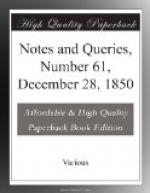Edward, the son and heir of Sir Thomas, died at Oxford, on the 28th August, 1643, and was buried in Christ Church. He was an ardent supporter of the king. The old baronet was selected as ambassador to Spain by Charles I., but was excused on account of his infirmities. He died A.D. 1654, in the eighty-third year of his age. His excellence and benevolence of character would afford presumptive evidence of the falsehood of the tradition, if it were not totally exploded by the absurdity of the hypothesis upon which it is grounded. Sir Thomas was succeeded in the baronetcy by his grandson, Robert, who in compliance with his will built an almshouse or hospital for five men and five women. It is unnecessary to pursue the family further, excepting to state that nearly at the close of the last century the entail was cut off: the family is now unknown in the neighbourhood, excepting in its collateral branches, and the hall has passed into the possession of strangers. Its last occupant was James Watt, Esq., son of the eminent mechanical philosopher. He died about two years ago, and the venerable mansion remains tenantless.
With reference to the ancient family residence of the Holts, at Duddeston, it will be sufficient to observe, that in the middle of the last century the house and grounds were converted into a tavern and pleasure gardens, under the metropolitan title of Vauxhall: and for a century they continued to afford healthful recreation and scenic amusement to the busy inhabitants of Birmingham. The amazing increase in the size and population of the town has at length demanded this interesting site for building purposes. Within the last three months the house and gardens have been entirely dismantled, a range of building has already been erected, and old Vauxhall is now numbered amongst the things that were.
J. GOODWIN.
Birmingham.
"Bloody Hands at Stoke d’Abernon, Surrey.—The legends of Sir Richard Baker (Vol. ii., pp. 67. 244.) and of a member of the Holt family (Vol. ii., p. 451.) recall to my mind one somewhat similar, connected with a monument in the church of Stoke d’Abernon, Surrey, the appearance of a “bloody hand” upon which was thus accounted for to me:—
“Two young brothers of the family of Vincent, the elder of whom had just come into possession of the estate, were out shooting on Fairmile Common, about two miles from the village; they had put up several birds, but had not been able to get a single shot, when the elder swore with an oath that he would fire at whatever they next met with. They had not gone much further before the miller of a mill near at hand (and which is still standing) passed them, and made some trifling remark. As soon as he had got by, the younger brother jokingly reminded the elder of his oath, whereupon the latter immediately fired at the miller, who fell dead upon the spot. Young Vincent escaped to his home, and by the influence of his family,




